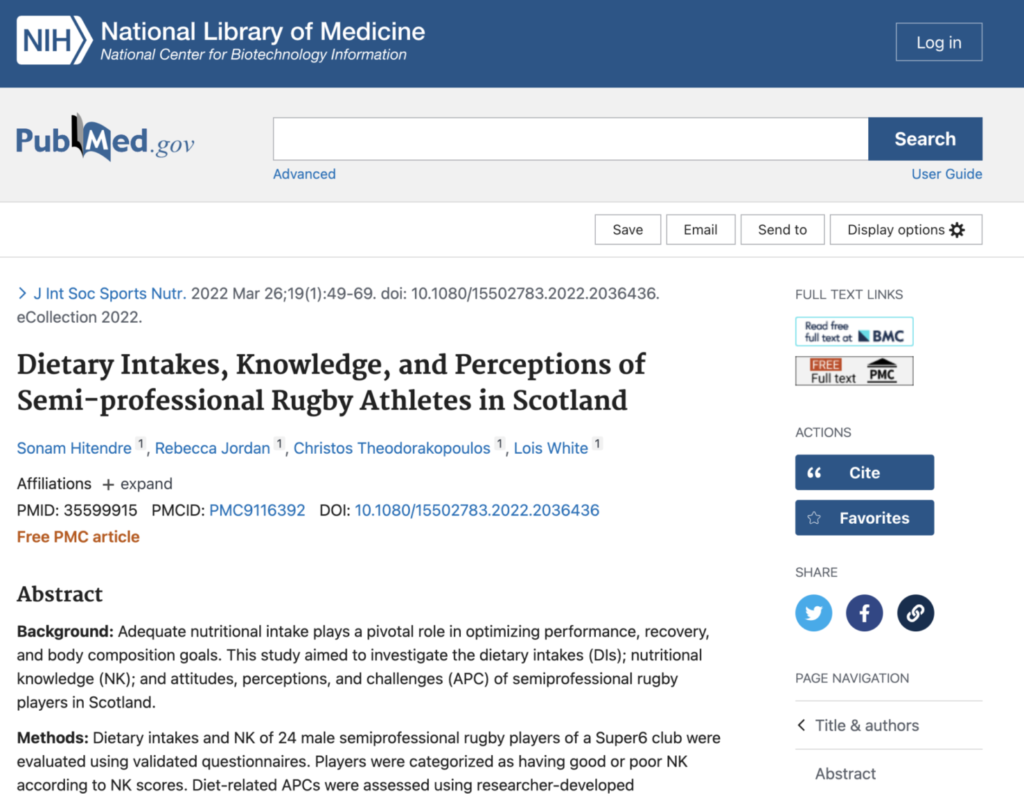Subject
Research Paper
Date
10 October 2022

Proper nutrition is crucial for enhancing sports performance and supporting recovery. Nutritional knowledge significantly influences food choices, and a lack of awareness can lead to suboptimal dietary decisions that may hinder athletic progress.
Background
Adequate nutritional intake plays a pivotal role in optimizing performance, recovery, and body composition goals. This study aimed to investigate the dietary intakes (DIs); nutritional knowledge (NK); and attitudes, perceptions, and challenges (APC) of semiprofessional rugby players in Scotland.
Methods
Dietary intakes and NK of 24 male semiprofessional rugby players of a Super6 club were evaluated using validated questionnaires. Players were categorized as having good or poor NK according to NK scores. Diet-related APCs were assessed using researcher-developed questionnaires and 1-1 semi-structured interviews.
Results
Mean ± SD total NK% was poor, 53.7 ± 11.9%. The ‘Good’ NK group scored significantly higher in the Weight Management (p = 0.014), Macronutrients (p < 0.001), Micronutrients (p = 0.001), and Sports Nutrition (p < 0.001) sections. Mean DIs from food sources were 26.3 ± 9.2 kcal/kg/day energy, 1.4 ± 0.4 g/kg/day protein, and 21.7 ± 10.1 g/day fibre. Median (25th,75th) carbohydrate intake was 3.0 (2.0, 3.0) g/kg/day, and 6.3 (2.3, 10.6) units/week alcohol. Mean ± SD fat and saturated fat (SFA) % total energy intake (EI) were 36.2 ± 3.7% and 12.8 ± 1.9%, respectively, and SFA %EI exceeded recommendations (p < 0.001). The ‘Good’ NK group had significantly higher intakes of all macronutrients (p < 0.05). Total NK% positively correlated with intakes of meat (r = 0.556, p = 0.011), cereals (r = 0.458, p = 0.042), dietary fat (r = 0.477, p = 0.034), vegetables (r = 0.487, p = 0.030), and alcoholic beverages (r = 0.541, p = 0.014). Supplement use was 68%. Players felt diet affected performance (94%) but 31% of them were unaware of any specific nutritional strategies. A healthy diet was perceived to be ‘balanced’ with ‘variety from all food groups. Lack of time for preparation was described as the main barrier to healthy eating.
Conclusions
Overall, players had poor NK, their fibre and carbohydrate intake was suboptimal, whereas saturated fat intake exceeded recommendations. Many lacked awareness of current sports nutrition guidelines. Further nutrition education may be needed to improve diet quality and aid performance goals.




